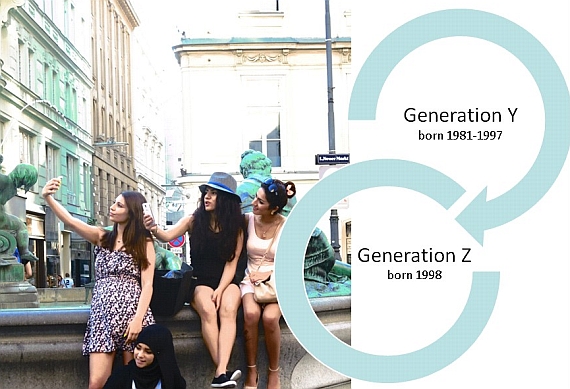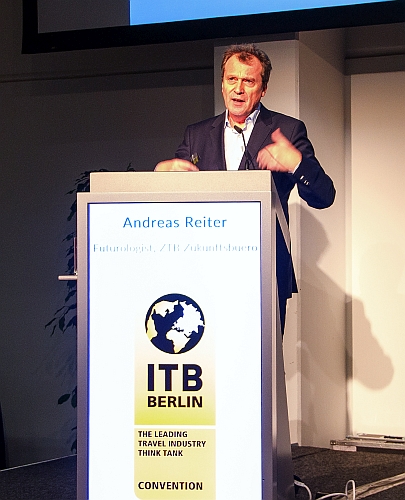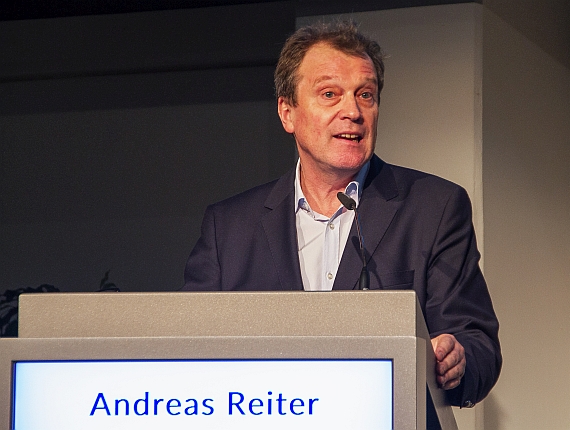ITB Hospitality Day 2016: Future researchers on the fluid future
 |
|
| Young generation with a new dynamic and new values. |
Berlin (April 22, 2016). Everything flows these days, though there are signs that the current has now become sensational... digital natives and millennials swim at the centre, sloshing into working life. From 2020, every second employee in the world will be a digital native. But what is a digital native? A member of that demanding generation, born towards the end of the past century with a super-ego and more expectations than willingness to work? Speaking at the "ITB Hospitality Day" in March, Andreas Reiter, Head of the ZTB Zukuftsbuero, as research institute in Vienna, explained why today it doesn't help to ignore this generation.
A high dynamic and high complexity already defines the "fluid future", as sociologist Zygmunt Baumann calls these times. Digital natives react to this complex world with striking breaks, based on changes caused by technology and values. Digital natives are already the precursor to robotic natives.
18 billion tools (machines, sensors, chips etc.) link people today with one another in a huge network, in just a few years it will be 50 billion, Andreas Reiter predicts: "Then, the car will speak to the red light!" From that point, we will all live in the "Internet of Things", all data about us and from us will be stored in the Cloud, our cars will drive themselves and all knowledge-based jobs will be done by professional nomads. The hybrid lifestyle is on its way.
 |
|
| Andreas Reiter: Leave the comfort zone! |
Digital natives are changing the mindset of society and thereby also in the workplace. "Everyone lives in a permanent social feedback loop," the future researcher said succinctly. Information and knowledge is permanently being shared, it's "connectivity" that counts and no longer the "collective", which sounds hierarchical. Everyone puts everything in circulation - clothes to swap, tools to lend, cars to call up as required... it's no longer possession of the object that counts but rather access to it.
New job every 18 months
Values are changing and the demarcation between work and private life is becoming more blurred. There's no more work-life balance, everything is mixed fluidly into everything else. A digital native wants to determine himself what he wants. 95% of them say they want to spend time with their families. And how are companies to react to that? By offering career models, the researcher recommends. And that should be the case from the very beginning. Indeed, 44% stated they changed their job every 18 months if they see their goals are not being met or if their work is no longer giving purpose to their lives. And it seems they're hardly interested in money. "They don't want to stay in a comfort zone," Andreas Reiter is certain, but quickly adds: "This can of course change as they get older".
In view of such job nomads, companies will have to become more agile and, at the same time, merge into small core teams; they outsource activities to network partners or other micro-companies. That's an opportunity and threat at the same time. Research has identified digital natives as goal-oriented "beta-animals" and not as power-hungry "alpha-animals" and therefore expects 'serial monogamy' when it comes to jobs and partners. Here, where employers are not shown loyalty, the digital native look for clear and secure structures - for instance in public service. As already stated, the job is a means of earning money and is no longer a lifestyle.
 |
|
| "Media consumption makes us crazy". |
Working and learning in bitesize pieces
For digital natives, critical thinking is just as important as creative thinking. Only this way can they break through fixed patterns and reduce the complexity of their environment. However, this generation can no longer focus for long. They watch videos for a mere seven seconds. The consequences of this sound frustrating from today's perspective: In future, knowledge must be presented in a playful way in small fragments - at the level of this generation.
Here, future researchers saw a huge challenge of hyper-connectivity. "Media consumption makes us crazy ... We only have tunnel vision..." And he poses the question how sensible it would be to be steered only by algorithms.
The lifestyle of digital natives sounds very "elastic" - and will certainly explode one or other of today's rigid systems. / map
Watch the video of the keynote at the ITB Hospitality Day session 2016 here in full length!
Continuative Links:
- April 15, 2016 Trendsetters don't only think digital-ITB Hospitality Day 2016 with discussion on innovation and on innovation labs
- April 8, 2016 More of everything and faster-ITB Hospitality Day 2016: Plateno CFO Eric Wu about the hotel giant from China
- April 1, 2016 Owning the customer: ITB Hospitality Day makes Google and Booking.com clarify their strategies
- March 18, 2016 Robots? Terrible but useful - ITB Hospitality Day: Humanoids still a joke but they will become job killers (short version)
To print this article you have to be registered and logged in for newsletter, visitor or subscription.





